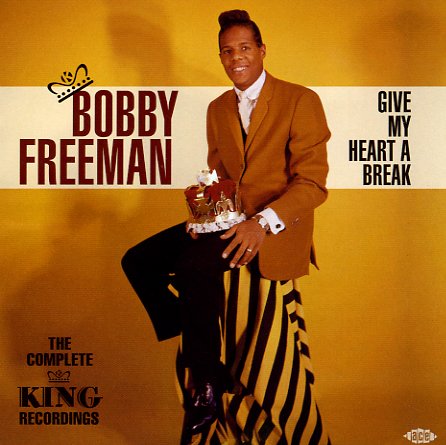
Bobby Freeman: Good Good Lovin
From Give My Heart A Break: The Complete King Recordings (Ace, 2009)
In between his big hits – 1958’s “Do You Wanna Dance†and 1964’s “C’mon And Swim†– Bobby Freeman recorded for a scant year for the legendary King Records. During this “lost†period, only one 45 was released during his stint, which, at the time, met with lukewarm results. Only after his Top 5 chart success with the Autumn label’s aforementioned “C’mon And Swim†did many of the recordings found on the new Ace release see a public release through 45s (as well as an accompanying compilation LP entitled “The Lovable Style Of Bobby Freemanâ€) as King was trying to capitalize on the success that they weren’t able to cash in on initially.
Most of the songs find their way on to the CD format for the first time, except for the cover of the Spaniels’ “Goodnight, Sweetheart, Goodnight.†More exciting than that is the fact there are 5 previously unissued songs, a couple of which Freeman penned himself. The material ranges from northern soul ballads to some real stompers.
Freeman found himself ready for Star Time when he recorded a very respectable cover of The Hardest Working Man In Show Business’ “Good Good Lovin,†which has some reminiscent, although not note-for-note, horn melodies of James Brown’s “Think.†Additionally, he covered Brown’s “Please Please Please,†using a more belting singing style than the more guttural approach of Brown’s version.
Freeman’s vocal abilities were beyond proficient, especially for a young singer who had just entered his 20s, as highlighted by his take on “Goodnight, Sweetheart, Goodnight.†The doo wop background helps to keep the song true to its origins of a sweet, end-of-the-night farewell, appropriately placed at the end of the disc.
His work at King carried on the tradition of early rock and roll while starting to show signs of his growing talent, artistry, and songwriting that would go on to influence Sam Cooke and others while keeping the crowd dancing with his performances on touring revues. In all, this compilation is an excellent snapshot of a growing artist that is as interesting for showing that growth as it is for exposing how labels hold back material (for reasons still unknown even today in this case).


chatter